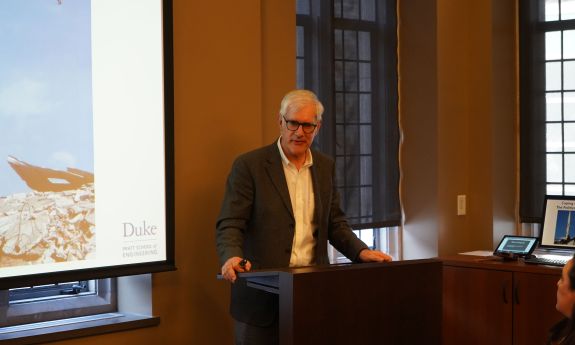Turkey’s Fate Was Sealed by Failures – Both Structural and Political, Experts Say
Duke experts look at the politics and engineering of earthquake damage


“Turkey’s development was based substantially on construction in the (Turkey President Recep Tayyip) Erdoğan era,” said Kuran. “Roads were built, and these enriched big contractors who returned the favor by supporting him politically and financially.”
The more power Erdoğan gained, the more centralized and corrupt the government became, he said. While one-man rule had been sold as efficient, no one could act, and no one could make major decisions without Erdoğan’s permission.
“Many critical decisions were not made until the third day, resulting in thousands of lives lost, there was a systemic failure of the Turkish state and that was because of the transformations of the past two decades,” Kuran said. “People on the ground couldn't think outside of the box. This was a consequence of a hyper-centralized government.”
While earthquakes are common in Turkey, the most recent one, followed by a second one of 7.5 magnitude and aftershocks, happen once in millennia, said Gavin, who offered this explanation: “Turkey is squeezed the way you would squeeze a watermelon seed and shoot it out from between your fingers. Unlike a watermelon seed between the fingers, the surface of a fault is not smooth and slippery, it is really complicated, and there are lots of opportunities for things to lock up and to build up stress until there is a rupture.”
In this case, it was the Arabian plate moving northward and grinding against the Anatolian plate.
“Turkey is squeezed the way you would squeeze a watermelon seed and shoot it out from between your fingers. Unlike a watermelon seed between the fingers, the surface of a fault is not smooth and slippery, it is really complicated, and there are lots of opportunities for things to lock up and to build up stress until there is a rupture.”
Henri Gavin
He equated it to 10 utility-scale electric power generators running full-steam 24 hours a day for 100 years and then having all that stored energy released at the same time.
“Physics changes when that happens, rocks melt and how we think of things sliding is totally different from what happens in an earthquake rupture like this,” Gavin said.
Although Erdoğan came into power promising changes after the 1999 earthquake, many were not enforced and shortcuts were common.
“In 2018 something big happened which is relevant to this earthquake – Erdoğan provided a conditional amnesty to hundreds of thousands of contractors – big and small -- who had been found at fault for code violations. The deal was they would pay a hefty fine and be pardoned,” said Kuran. “The state collected 3.1 billion in fines; we don’t know how it was spent.”
For students such as Tim Heffernan, who like Güllü is in Duke’s MAPE program, the events taking place in Turkey today provide insight into what he has learned in the classroom.
“To see some of those dynamics we discussed in class playing out in real-time as the bureaucracy attempts to move and respond to the events we have seen in the past week has been interesting and in some ways horrifying in its own right,” he said.
With Turkey’s election scheduled for June 18, Heffernan and others will see more events play out in real time, which Kuran suggests will not go in Erdoğan’s favor.
“Under the circumstances, I don’t think Erdoğan can win except through massive fraud,” Kuran said. “My own feeling is if Erdoğan feels he will lose the election, he will leave and many of his cronies will, too.”